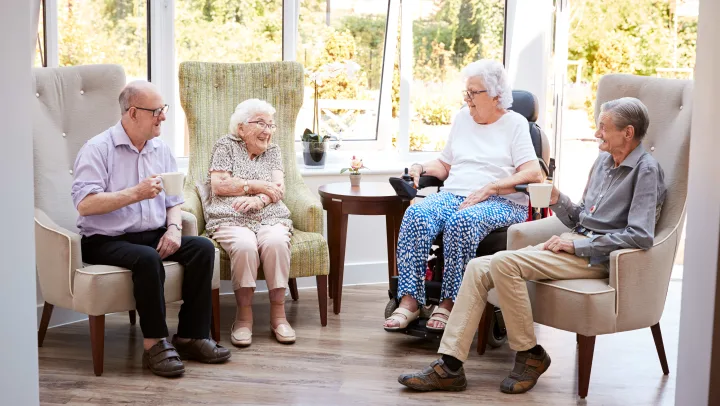The Function of Assisted Staying In Providing Specialized Take Care Of Mental Deterioration Patients
The provision of specialized treatment for mental deterioration clients within assisted living facilities is significantly acknowledged as an important component of effective mental deterioration monitoring. These environments are developed to address the one-of-a-kind cognitive and psychological challenges faced by people with dementia, supplying customized support that promotes safety and health.
Comprehending Dementia Treatment Requirements
Understanding the treatment needs of people with dementia is crucial for giving efficient support and enhancing their high quality of life. Dementia is a dynamic neurological condition that influences cognitive functions such as memory, thinking, and communication. Individuals with mental deterioration frequently call for support with day-to-day activities, customized treatment strategies, and emotional support.
Reliable dementia care includes identifying the distinct difficulties encountered by each individual. This consists of understanding the stages of mental deterioration, which can vary from mild cognitive disability to sophisticated phases needing comprehensive support. Treatment requires might encompass support in handling daily regimens, drug adherence, and keeping social communications to avoid isolation.
Furthermore, sensory excitement and familiar atmospheres can substantially boost the health of people with mental deterioration. Caretakers must be educated to recognize behavior adjustments and use strategies tailored to each individual's choices and past experiences. Techniques such as validation therapy and reminiscence can help communicate effectively and promote a feeling of safety and security.
Ultimately, successfully addressing the care demands of people with mental deterioration calls for a caring strategy, recurring training for caretakers, and a dedication to preserving dignity and respect throughout the caregiving process.
Benefits of Assisted Living

One more significant advantage is the secure and secure setting these facilities offer. Homeowners gain from attributes such as secured entryways and checked common locations, minimizing the danger of straying and enhancing overall security. Furthermore, assisted living promotes social interaction among citizens, fostering a feeling of area and belonging. Engaging with peers can minimize sensations of seclusion, which are usual in those living with mental deterioration.
Furthermore, many nursing home provide help with day-to-day activities, such as medication management, bathing, and meal preparation. This support permits residents to keep their independence while guaranteeing their wellness and health are focused on. Inevitably, assisted living acts as a beneficial source, stabilizing care and autonomy for individuals with dementia and their households.

Specialized Programs and Activities
In addition, art and music treatment play considerable roles in cultivating imagination and emotional expression (Memory Care). Engaging residents in paint, crafting, or music sessions can give restorative benefits, assisting to reduce anxiousness and boost mood. Exercises, such as mild exercises and dance sessions, are additionally vital, as they promote flexibility and physical health and wellness while motivating social interaction amongst residents
Organized daily regimens are commonly established to give a sense of stability and predictability for individuals with mental deterioration. These routines can consist of scheduled meal times, here team activities, and personalized treatment strategies that satisfy private interests and capabilities. By developing an enhancing setting loaded with tailored activities, helped living centers not only improve the lifestyle for dementia clients yet also promote a feeling of area and belonging.
Trained Personnel and Assistance
Furthermore, skilled team are geared up to carry out personalized care strategies customized to each homeowner's choices and capabilities. This personalized technique cultivates a sense of autonomy and self-respect, permitting residents to take part in significant tasks that enhance their lifestyle. The personnel likewise play an essential role in keeping an eye on wellness and health, promptly identifying any kind of changes in condition that may need medical interest.
In enhancement to guide treatment, skilled personnel give emotional support to residents, helping to reduce feelings of confusion and anxiety that typically go along with mental deterioration. Their caring method creates a nurturing environment where residents feel valued and recognized - Memory Care. Inevitably, the proficiency and dedication of qualified staff are essential in delivering comprehensive treatment that satisfies the complicated needs of individuals coping with dementia in assisted living settings
Family Involvement and Resources
Family participation plays a substantial function in the care of individuals with dementia in assisted living facilities. Involving household members in the treatment procedure not only boosts the emotional well-being of the homeowner however additionally promotes a collaborative setting where care strategies can be customized to individual demands. Households can provide useful insights right into the preferences, history, and habits of their loved ones, which can educate caregivers and bring about more tailored care approaches.
Additionally, helped living centers typically offer resources for family members, such as support system and educational workshops. These sources can help households understand mental deterioration, improve communication approaches, and develop coping devices. Participation in these programs can equip relative, outfitting them with the tools essential to support their liked ones properly.
Additionally, routine interaction between family members and staff is important. This continuous discussion permits families to stay educated about their loved one's development and any type of adjustments in care plans. Ultimately, a solid partnership between families and assisted living facilities fosters a setting of depend on and understanding, guaranteeing that people with mental deterioration obtain the specialized treatment they deserve while preserving their household links.
Verdict
In conclusion, aided living facilities play an essential duty in addressing the special requirements of dementia people with customized care and support. Eventually, assisted living supplies vital resources that dramatically enhance the quality of life for those living with mental deterioration.
Comments on “Discover the advantages of Assisted Living for aging adults.”